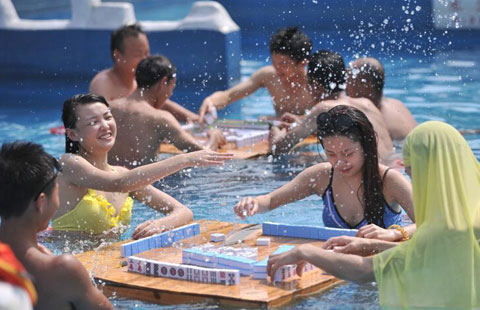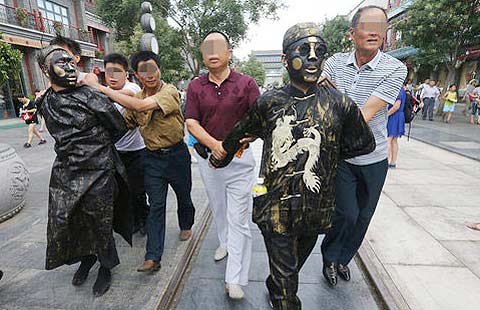Nanjing to clean air before Youth Games
Updated: 2014-07-09 07:31
By Luo Wangshu and Cang Wei in Nanjing (China Daily)
|
|||||||||||
Nanjing is going all-out to guarantee the best air quality possible in the city as it prepares to host the 2014 Summer Youth Olympic Games in August.
"We shut down polluting enterprises this year, closing about 30 factories since March," Nanjing Mayor Miu Ruilin said.
The capital of Jiangsu province is also restructuring its industrial focus, Miu said.
During the Games, from Aug 16 to 28, about 3,800 athletes 15 to 18 years old will compete in 28 sports. The first summer Youth Olympic Games took place in Singapore in 2010.
"The environment is one of the most important issues and deserves to be given top priority. It is important to guarantee air quality during the Games. It is also important after the Games," Miu said.
The city government released a temporary environmental management regulation in May with 35 directives for improving air quality from May 1 to Aug 31.
Under the regulation, factories that use coal furnaces had to shut down before June 30. From Aug 1, heavy-industry factories must begin to reduce manufacturing by 20 percent; all construction sites must stop work; and open space barbecue restaurants must close.
Nanjing, along with places in the Yangtze River Delta area, including Shanghai and Zhejiang province, released a joint plan to guarantee environmental quality during the Games.
The city is improving public transportation to encourage people to leave their cars at home. Vehicle emissions, the main source of PM2.5 and PM10 particulate matter, have a large effect on air quality.
"We're opening three new subway lines right before the Games, one on July 1 and two on Aug 1," the mayor said, adding that the city's subway lines will have increased in August from 80 km before July to 135 km.
With the new subway lines, Nanjing will top Shenzhen as the city with the fourth-most amount of subway lines, ranking behind Beijing, Shanghai and Guangzhou.
"Because of the Games, subway construction is being accomplished ahead of time, at least five years in advance," Miu said.
But the city will not restrict vehicles during the Games, as Beijing did during the 2008 Summer Olympics.
At the time, Beijing banned private cars in the city's urban areas 15 days a month while extending subway hours.
Nanjing is also taking a market-driven approach to control private cars by increasing parking fees in downtown areas.
Local media reported that since June 15, the street parking fee downtown has increased to 20 yuan ($3.20) an hour and tops 244 yuan a day.
The one-day street parking charge previously was about 10 yuan.
Nanjinger Zhu Xia, who lives near Jiangdong Road, said she has to switch to the subway to avoid the "scary parking fees" downtown.
"I'll have to pay more than 200 yuan a day," said the 38-year-old, who works in Xinjiekou, the city's central business district. "Commuting by subway is much cheaper, but it can get really crowded."
Zhu also said that she has to walk 20 minutes from her home to the subway station, which she considered "too long during the hot summer and chilly winter days".
By the end of June, four subway lines and 75 stations across the city had been put into use.
"We encourage people to take public transportation for the environment," Miu said, adding that during the Games, visitors can take the bus for free after showing Games tickets.
luowangshu@chinadaily.com.cn
Related Stories
On alert for upcoming Youth Games 2014-06-28 07:17
Shanxi decides to bid for the 2019 National Youth Games 2014-06-06 16:26
Youth Games: Renewal in Nanjing 2014-03-27 08:50
Asian Youth Games urged to 'Say No to Doping' 2013-08-18 15:19
Today's Top News
Black boxes handed over from crash site
News as fast food not a healthy diet
Huawei bolsters UK presence
EU extends sanction relief on Iran
Int'l investigation team on MH17 formed
Meat supplier of McDonald's, KFC suspended in Shanghai
Gaza death toll pass 100
Lunar rover is 'awake'
Hot Topics
Lunar probe , China growth forecasts, Emission rules get tougher, China seen through 'colored lens', International board,
Editor's Picks

|

|

|

|

|

|





